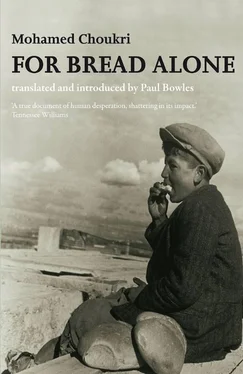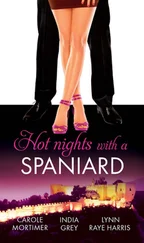What does that man want? I asked her.
Shut up!
I look back at him and see him smiling. He goes on following us. What does this man want of my mother? Does he want to kidnap her? A kidnapper! No, he’s probably a thief. He looks bad.
I held her hand tightly. Why are you squeezing my hand so hard? she demanded. I’m not going to run away from you.
Go away! I shouted at him, furious. Allah inaalik!
He’s smiling. He smiles at my mother and me, and I stare angrily into his face. I told you to shut up, she said.
In my head I grew angry with her too. I try to take care of her and she tells me to shut up.
She stopped to chat with a woman she knew. I saw the man going along, farther and farther away from us. The woman patted my head and ran her rough hand over my face. I let go of my mother’s hand so she would be free to talk, and wrapped my arms around her legs.
Why is your Mohamed so unhappy? the woman asked my mother.
My mother looked down at me and cupped the back of my neck in her hand. The gesture made me feel better.
He’s always like this. He’s a strange boy.
They said goodbye to one another. Kiss Lalla el Ouiza’s hand, my mother told me.
Obediently I kissed the hard hand she held out.
I noticed that my mother’s belly had begun to swell. Some days she does not go to the market. She stays at home, and she vomits now and then. She is pale and her legs are swollen. She sobs. Her belly swells and swells. I began to wonder if it would burst. I no longer noticed her sobs. Each day I am growing harder and gloomier. Hard, hard. Sad. I have forgotten how to play.
One night, half asleep, I was carried to another house, where I fell asleep again in the midst of three other children. In the morning, the neighbour woman, whose husband had been killed in an accident at work a few days earlier, came to me and said: Your mother has a baby girl. Now you have a sister.
Once a week my mother goes to see my father in the jail. Sometimes she comes back weeping. I began to understand that women cry more than men. They start and stop easily, like children. Sometimes they are upset when you think they are going to be pleased. And they laugh when you think they are going to be angry. And often it’s hard to tell whether they are sad or happy. When are they going to laugh and when are they going to cry?
I stay at home to take care of my sister Khemou. I know how to amuse her, but not how to make her stop crying. It bothers me finally, and I go outside. I leave her there crying, paddling her crooked arms and legs, like a tortoise on its back. When I go in the next time I find her asleep, or merely smiling. Usually asleep, while the flies buzz around her face, already irritated by mosquito bites. At night the mosquitoes and in the daytime the flies.
My sister grows. Now my mother does not cry so much. She has fewer complaints. I am becoming meaner, sometimes with my mother and sometimes with the boys in the street. When I feel myself overcome, either by her or by them, I break things, or throw myself down screaming insults and hitting myself.
She began to take me and Khemou to market with her. Khemou drinks at my mother’s breast. I usually look for my food far from either of them. Sometimes I beg and sometimes I steal.
For the first time I dared say to her: If you don’t let me do what I want, some day I’ll go away from this house, and never come back.
Aha, the beetle talking! If you’re like that already, what will you be like later?
One morning as we walked through the Zoco de Fuera, my father bore down on us. He was on his way to find us, and he was with a woman who was going to show him where we lived now. My mother began to cry, there in the market. Why is she crying about him? I wondered. He’s like a wild animal, and he’s always in a bad temper.
That night I fell asleep as they argued and wrangled. In the morning my mother did not go to the market. Instead she went to the hammam . Later I found her making up her face. She looked very happy. Then when my father went out I saw her crying again. I did not know any woman could cry so much. I decided to ask her what was the matter. She told me that my father had gone out to look for the soldier who had denounced him, and now they were going to kill each other.
I hoped he would find the soldier so that we could go on living in the house without him. One of them would kill the other, and that was all I wanted. I like it when he’s absent, and hate it when he’s in the house.
In the afternoon he came back dejected, giving off a smell of wine. I heard my mother say: You’ve been drinking, haven’t you?
He mumbled a few words and sat down exhausted. He is sad because he has not found his enemy, and I am sad because he has come back.
I heard them talking about a trip to Tetuan. They were still discussing it when I went to sleep. I woke in the night with a full bladder. The sound of kisses, like the clapping of hands. Hard breathing, tender murmurs. They like each other. I hate their love. Flesh clapping. Pfou! She tells lies. I’ll never believe her again.
No. Not like that.
What are they doing?
Like this.
No! No! It hurts. Like this. Like this. That’s better. No, no! Like this. Yes, that’s right.
Breathing, kisses, groans, breathing, kisses, groans. They are biting each other. They are devouring one another, licking each other’s blood.
Mmmmm!
He’s stabbed her.
A long soft moan.
He’s killed her.
I feel my bladder emptying itself. The warm liquid running between my thighs feels good.
The day before we left for Tetuan I saw the girl who had given me the bread and honey. I told her about the trip we were going to make. She took me home to her house with her. There I ate brown bread with butter and honey. And she gave me a large apple, and filled my pockets with almonds. She washed my face and hands. Then she combed my hair for me and cut it, rubbing her fingers over my cheek as she did so, and put eau de cologne on me. She brought out a small mirror and told me to look into it. I obeyed, but I looked more intently at her than at myself.
She took my head between her hands, the way I would have taken a small bird so as not to injure it. First she rubs my cheek tenderly and then she tickles it with her fingertips. When she said goodbye she kissed me on the cheek and then on the lips. She was a sister to whom my mother had not given birth.
The day we left for Tetuan, I remembered Abdelqader’s grave. No one would put water on it, or sprigs of myrtle, and there were still no tiles around it. His grave will be invisible among all the others. It will get lost, the way little things always disappear among the big ones.
We had found a house by an orchard in the quarter of Aïn Khabbès. My mother went back to selling vegetables in the street. This suited my father, who liked nothing better than to sit in the garden of the Feddane, deep in conversation with the wounded veterans of the Spanish Civil War. I ran errands for our Spanish neighbours. My sister rolled on the floor and tried to learn to walk. Soon my father found me work in a nearby café. My day lasted from six in the morning until after midnight. Each month my father went and collected the thirty pesetas I had earned with my work. He did not give me any of it. He was using me, and I hated him for it, as I hated everyone who used others in this way. My father uses my mother and me. The man who runs the café uses me, too, since he makes me work longer than I should. But what can I do?
I can steal. I can steal from anybody who uses me.
I began to think of stealing as a way of regaining that which had been taken from me. The café had two separate clienteles, the daytime one and the night-time one, but on holidays they mingled. Then those of the daytime learned what went on at night, and those of the night-time asked for news of the daytime. I smoked in secret. The first time I ate a piece of majoun I fainted. Later I vomited what looked like moss. I went on being sick for several days, and life looked strangely different during that time. Illness makes one more alone. I understood that I was only I, face to face with myself.
Читать дальше












